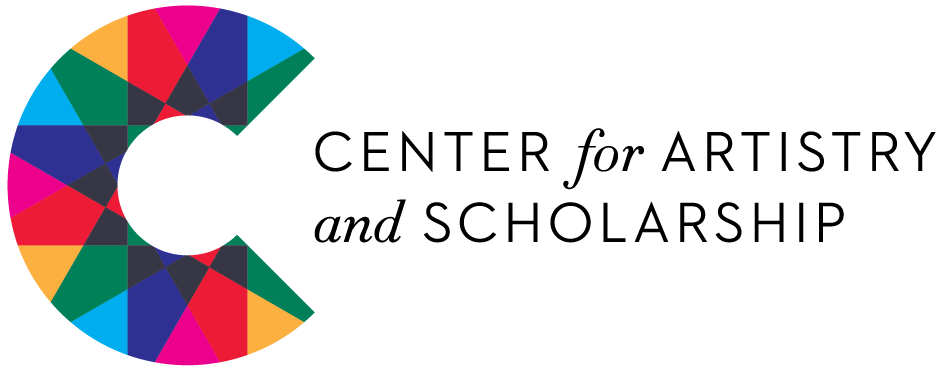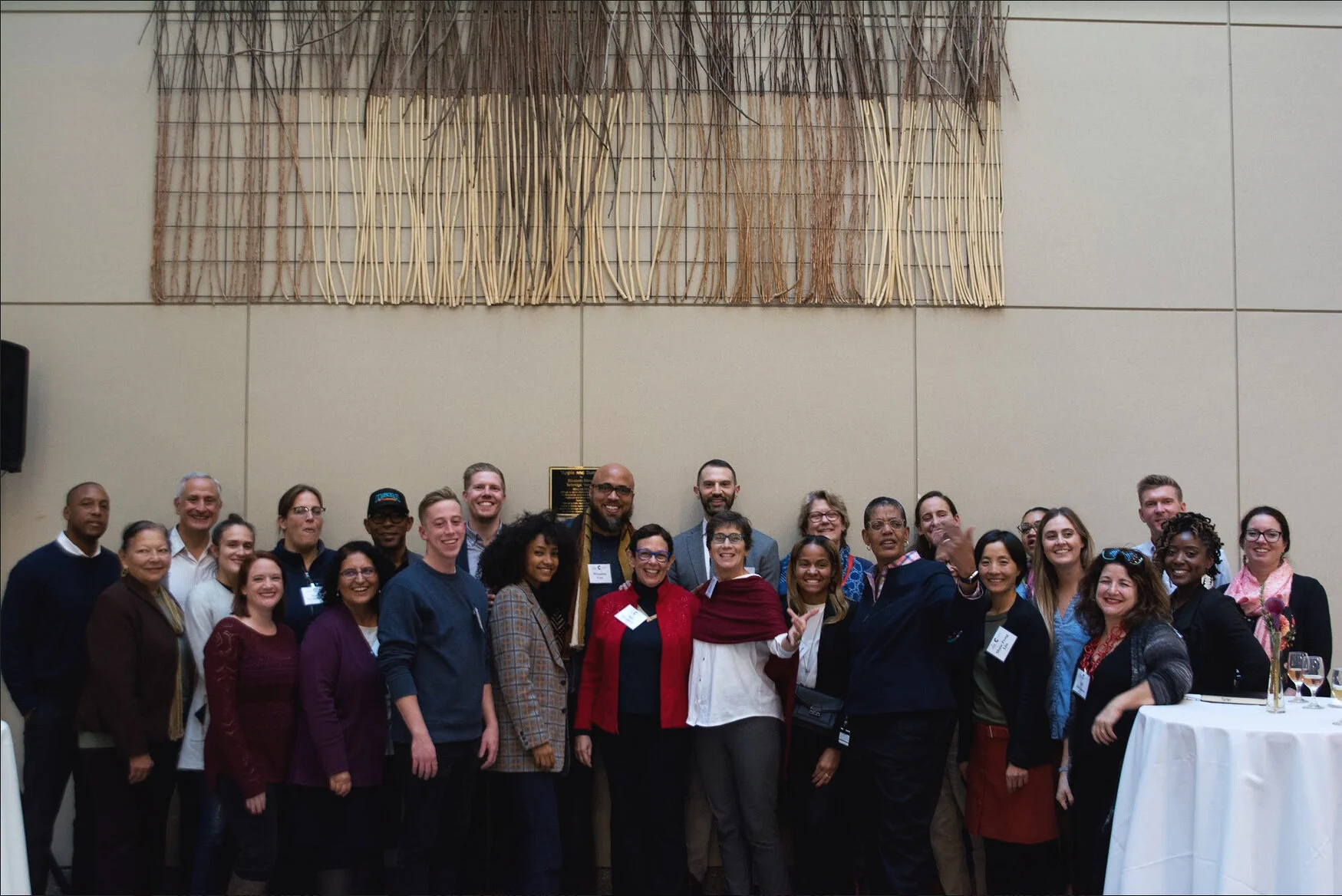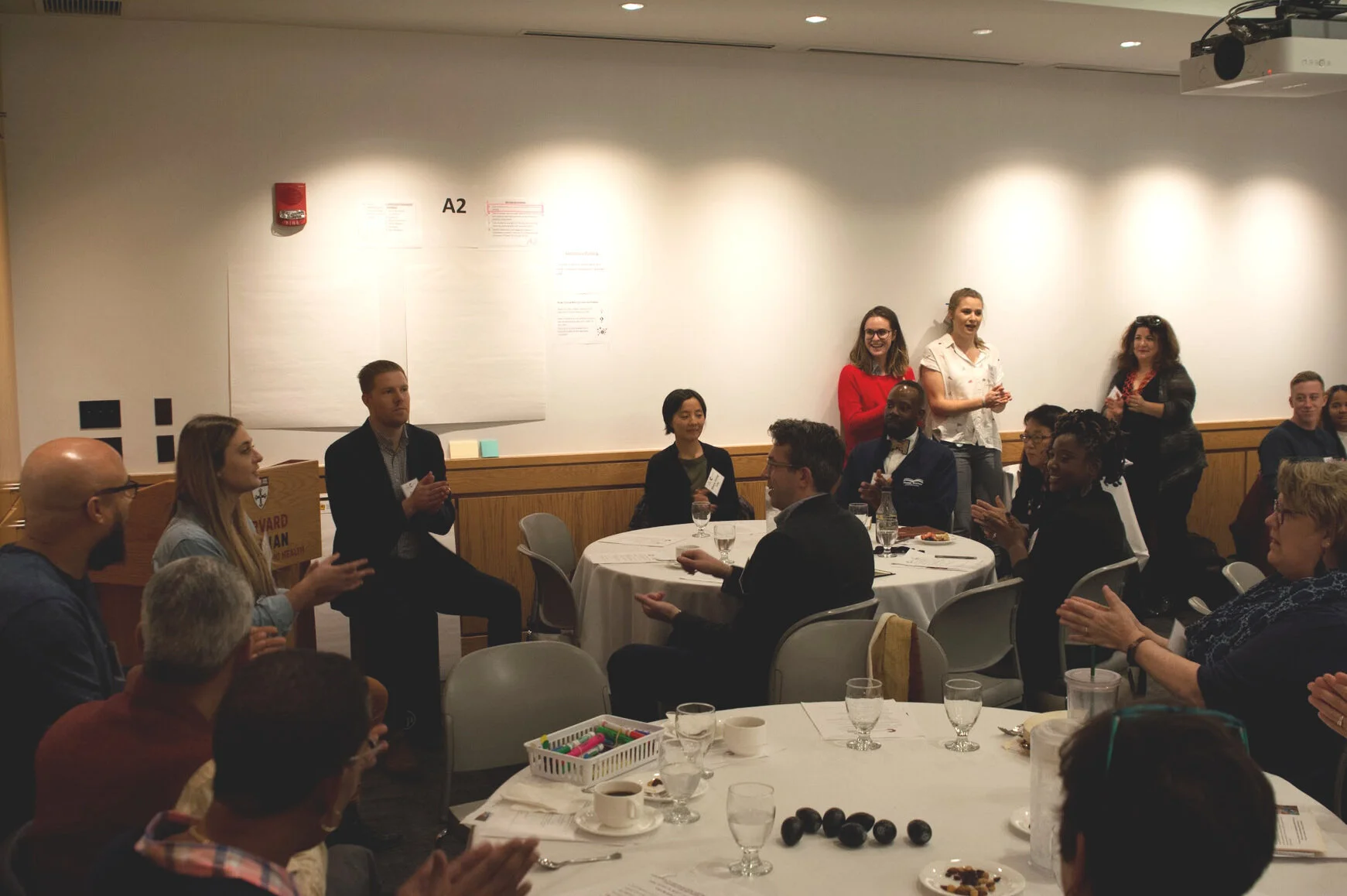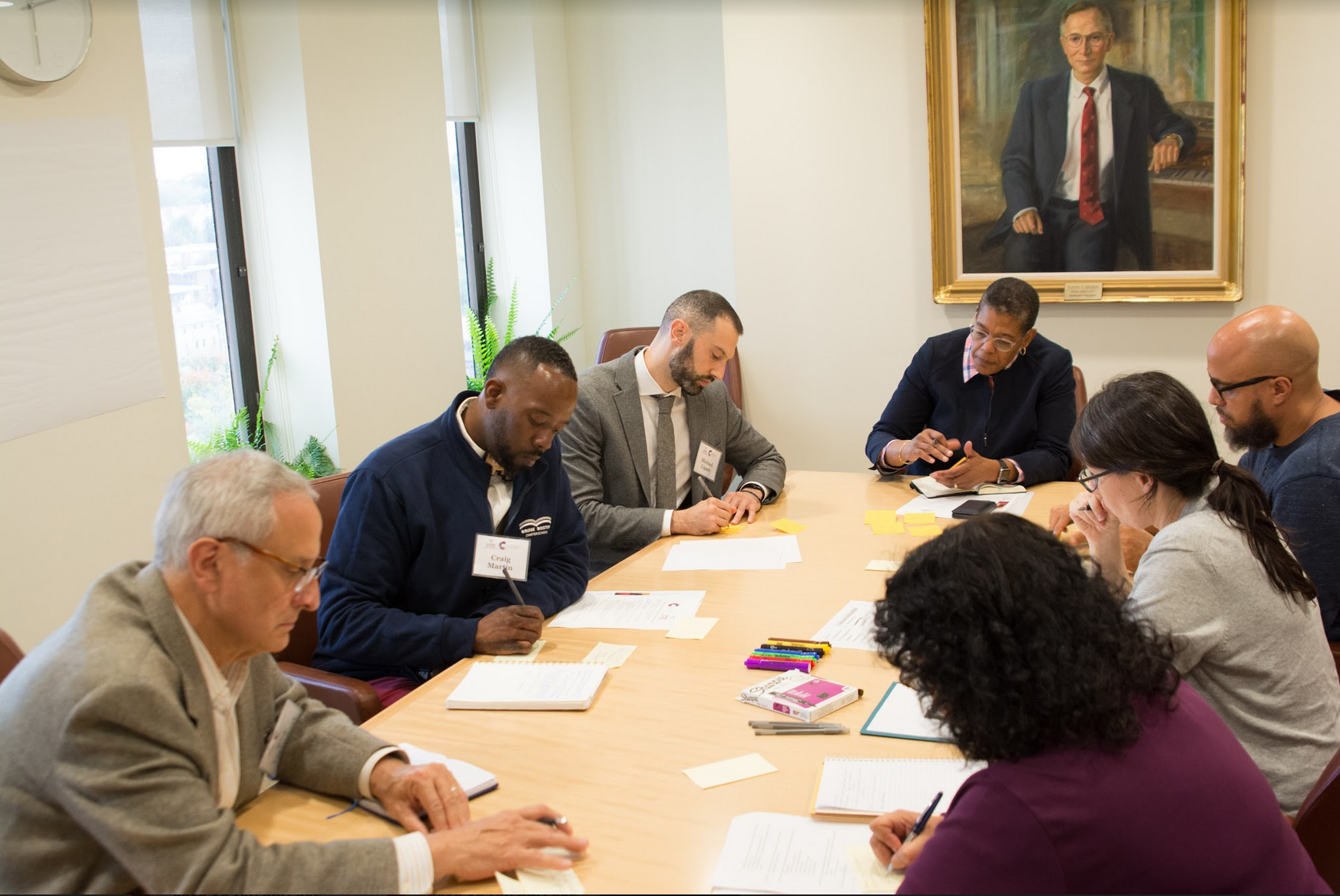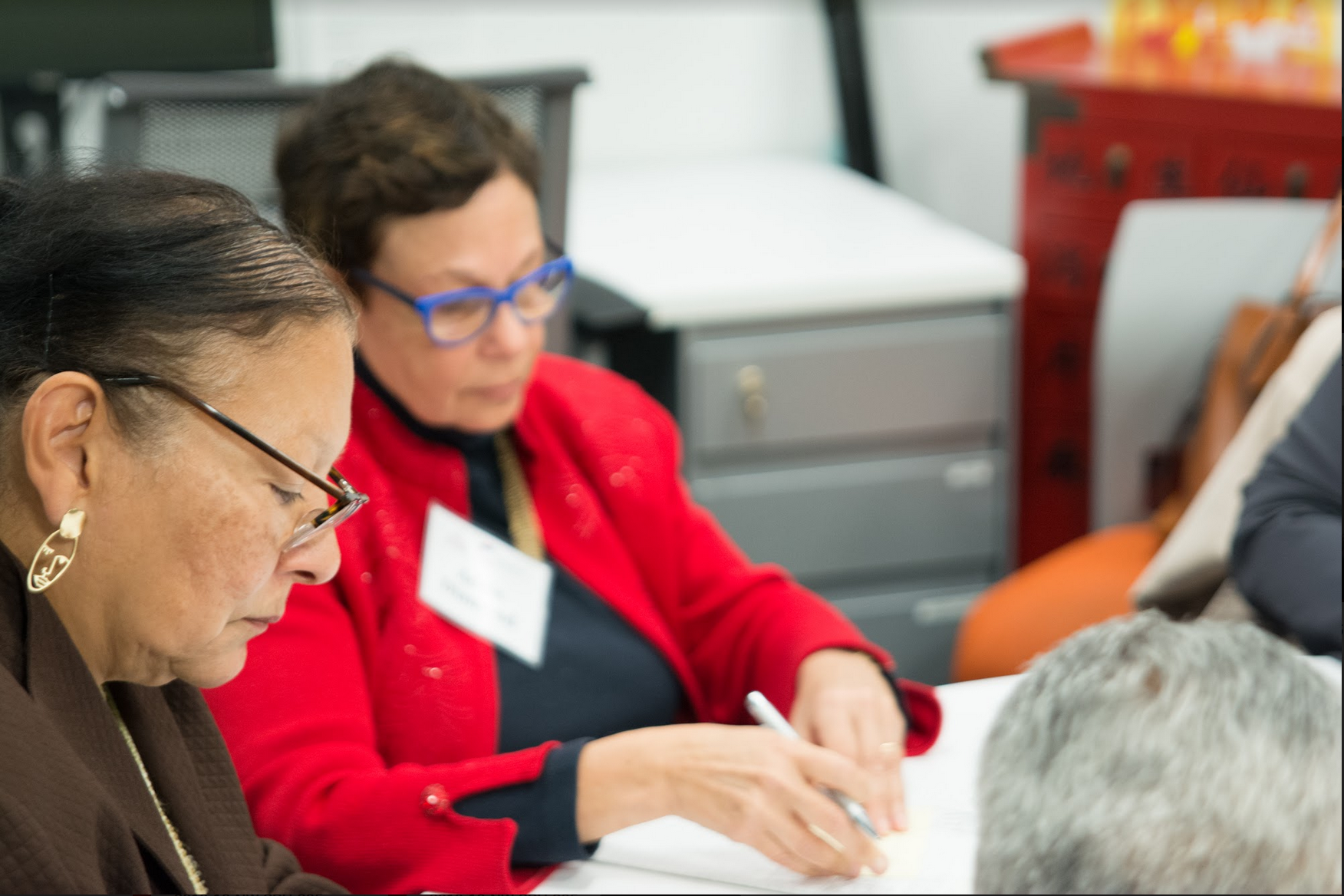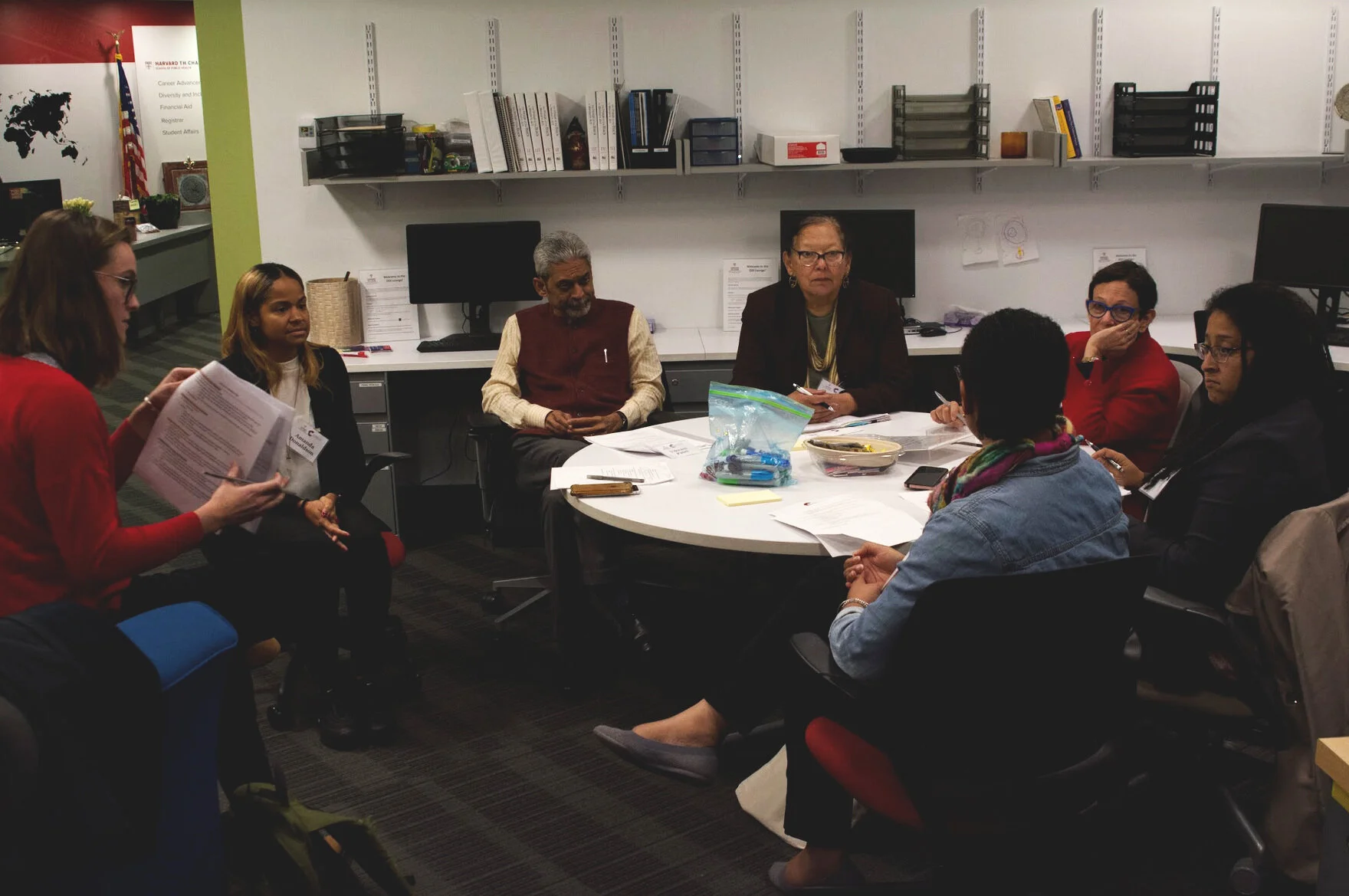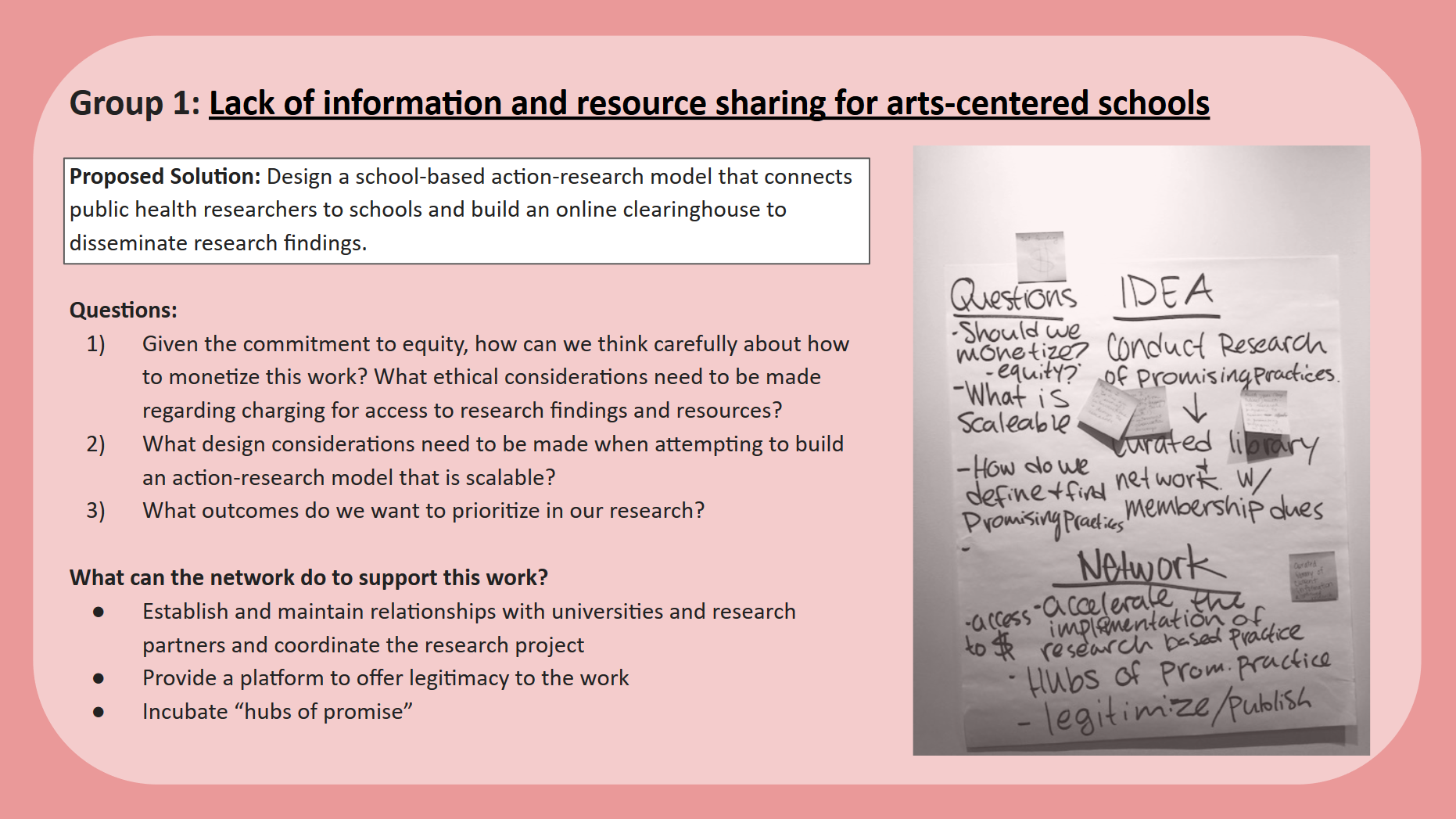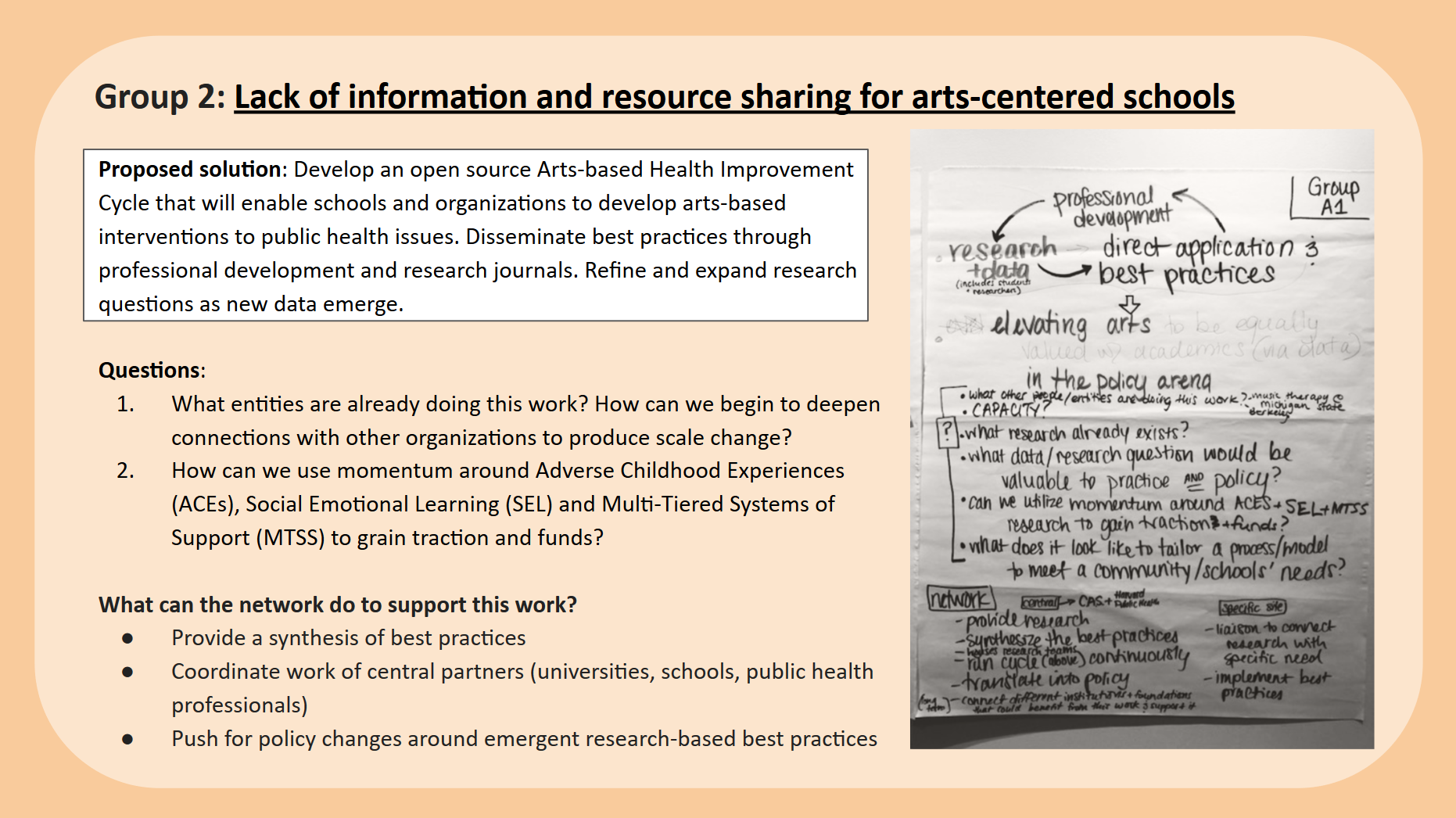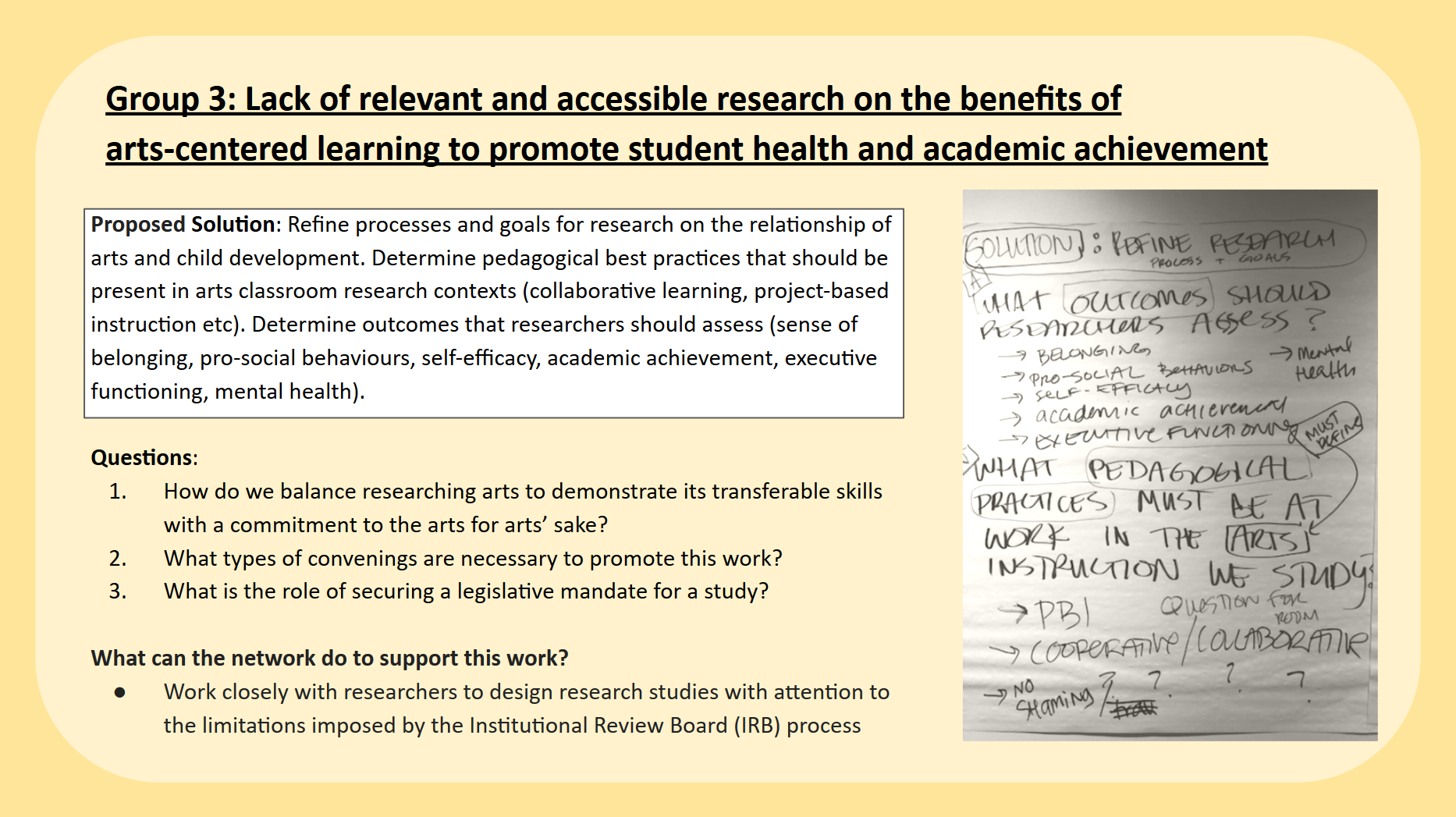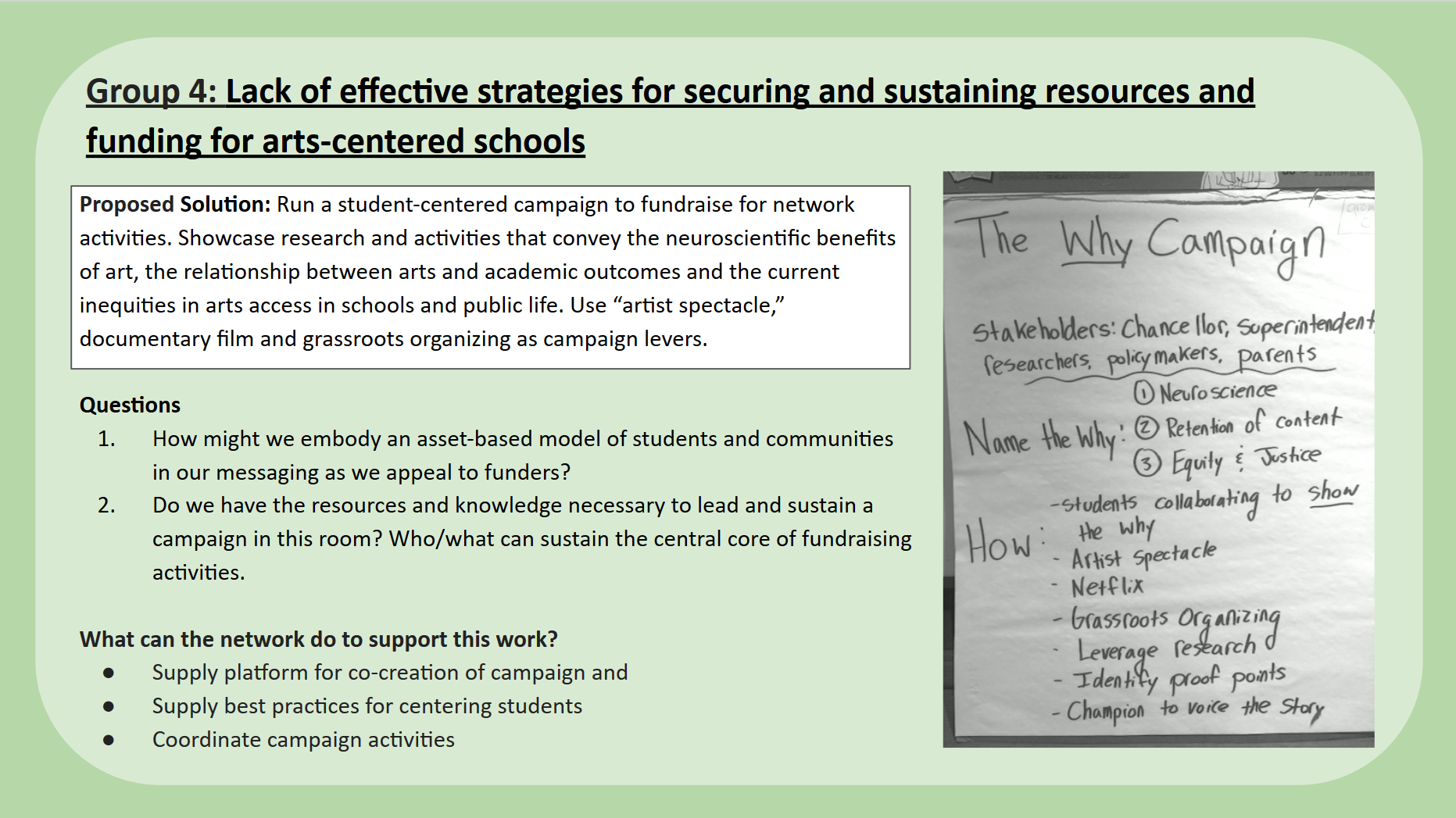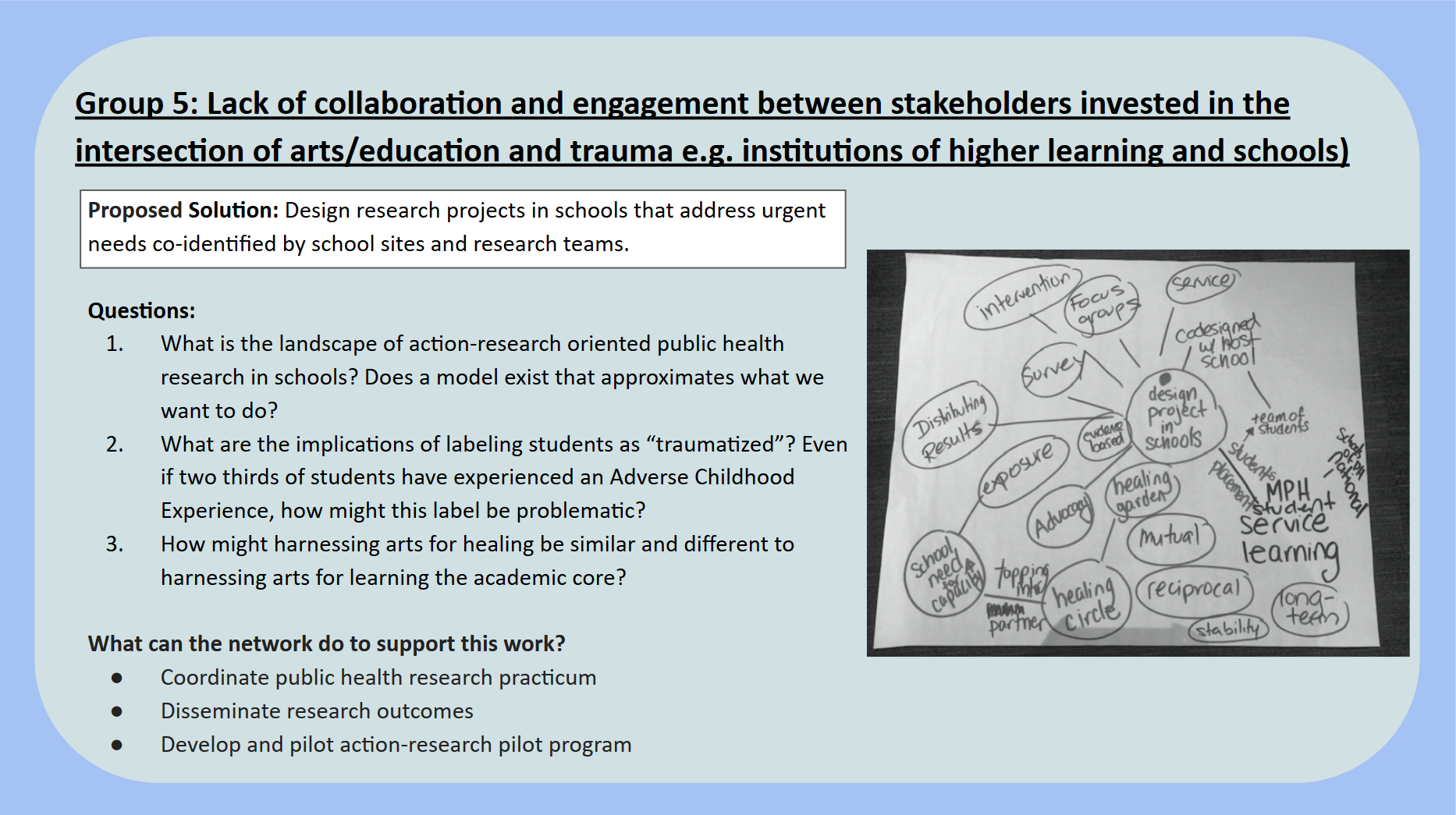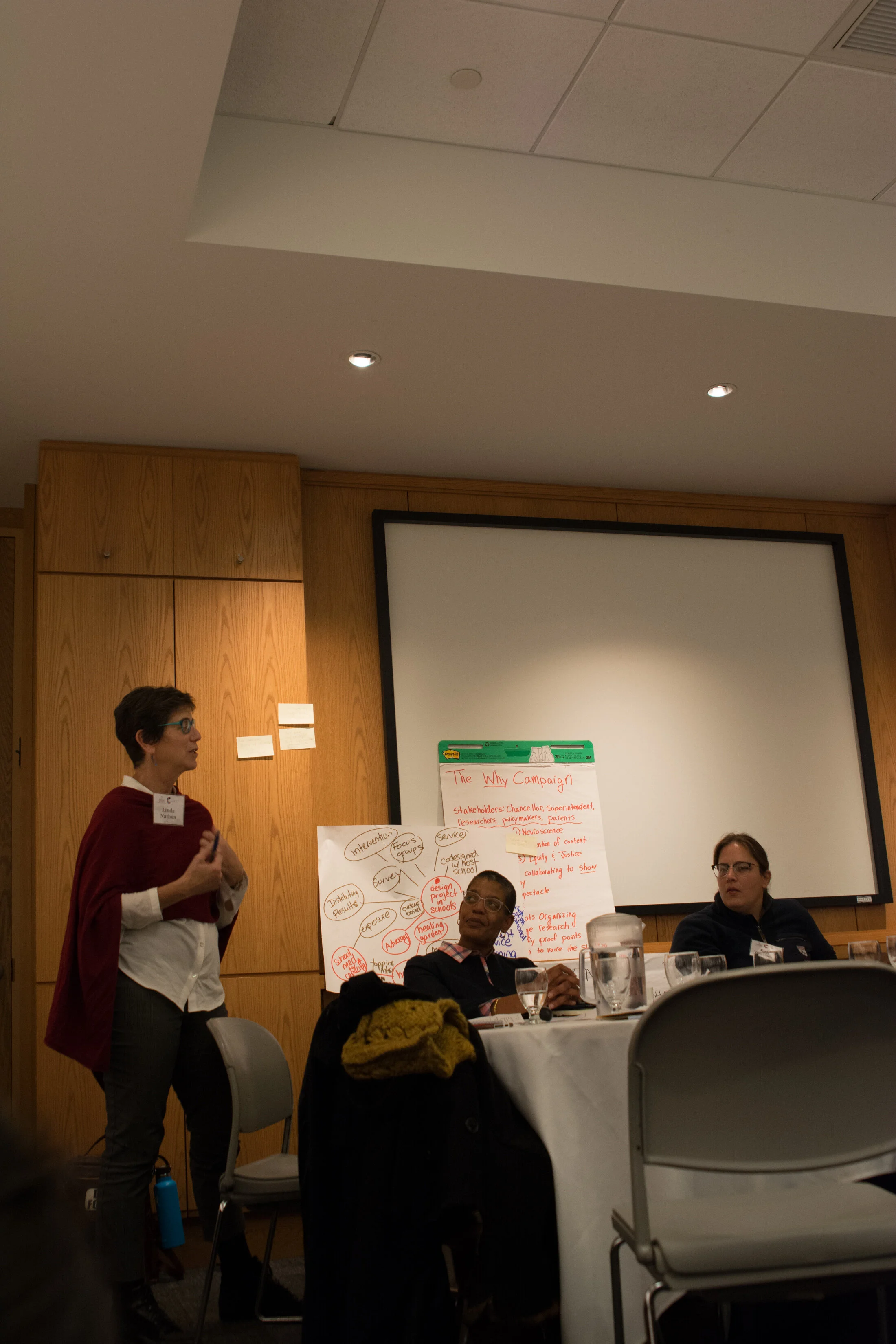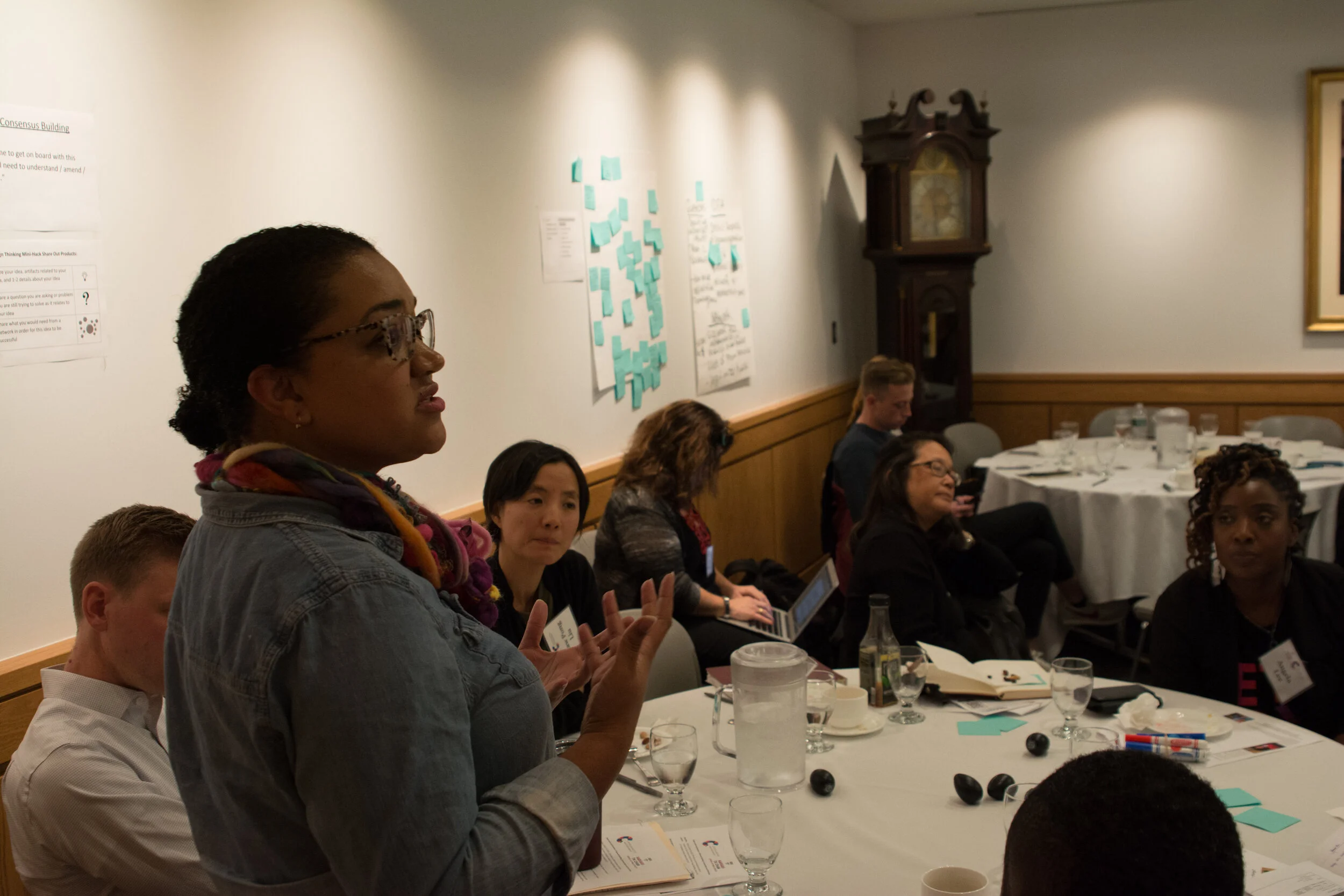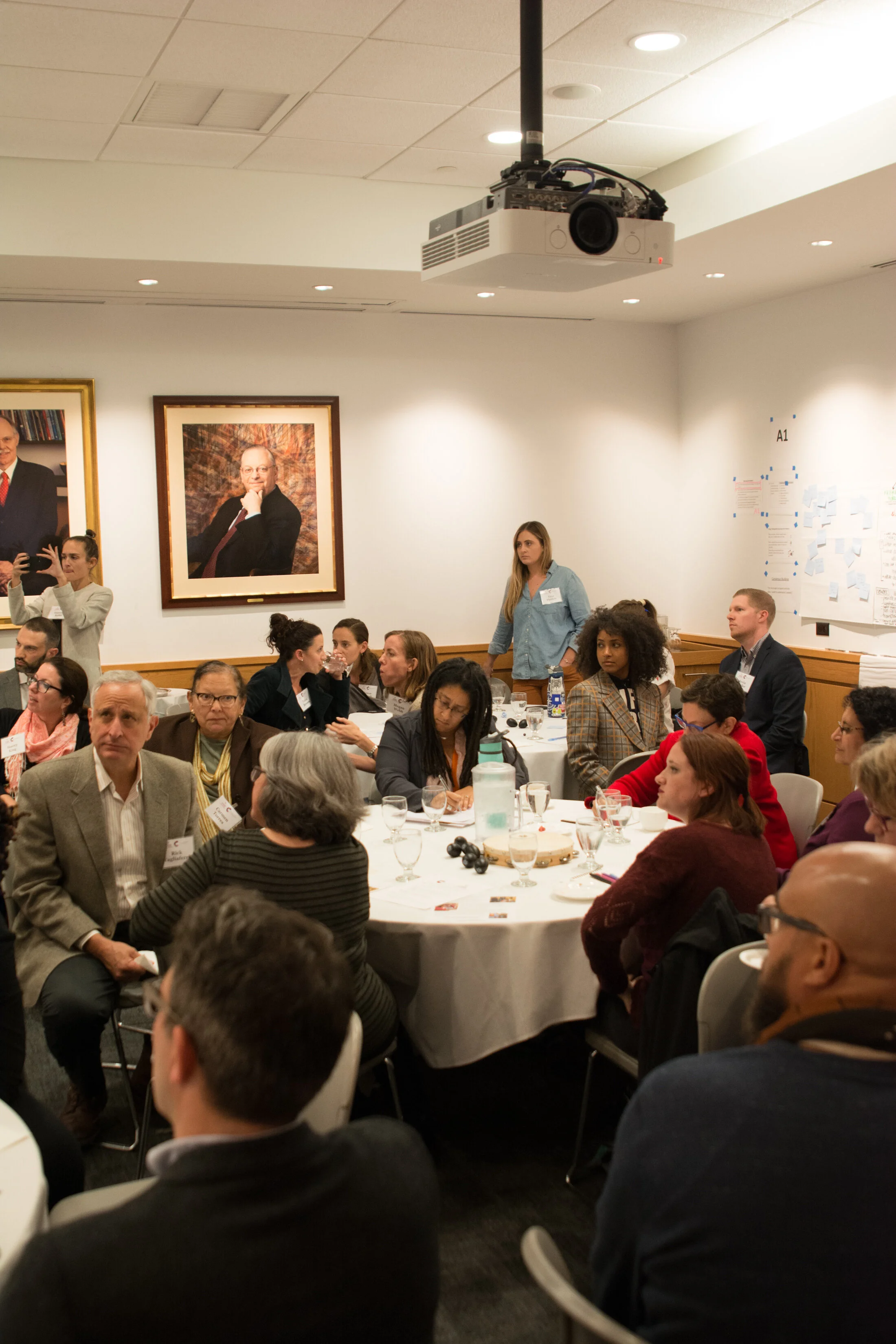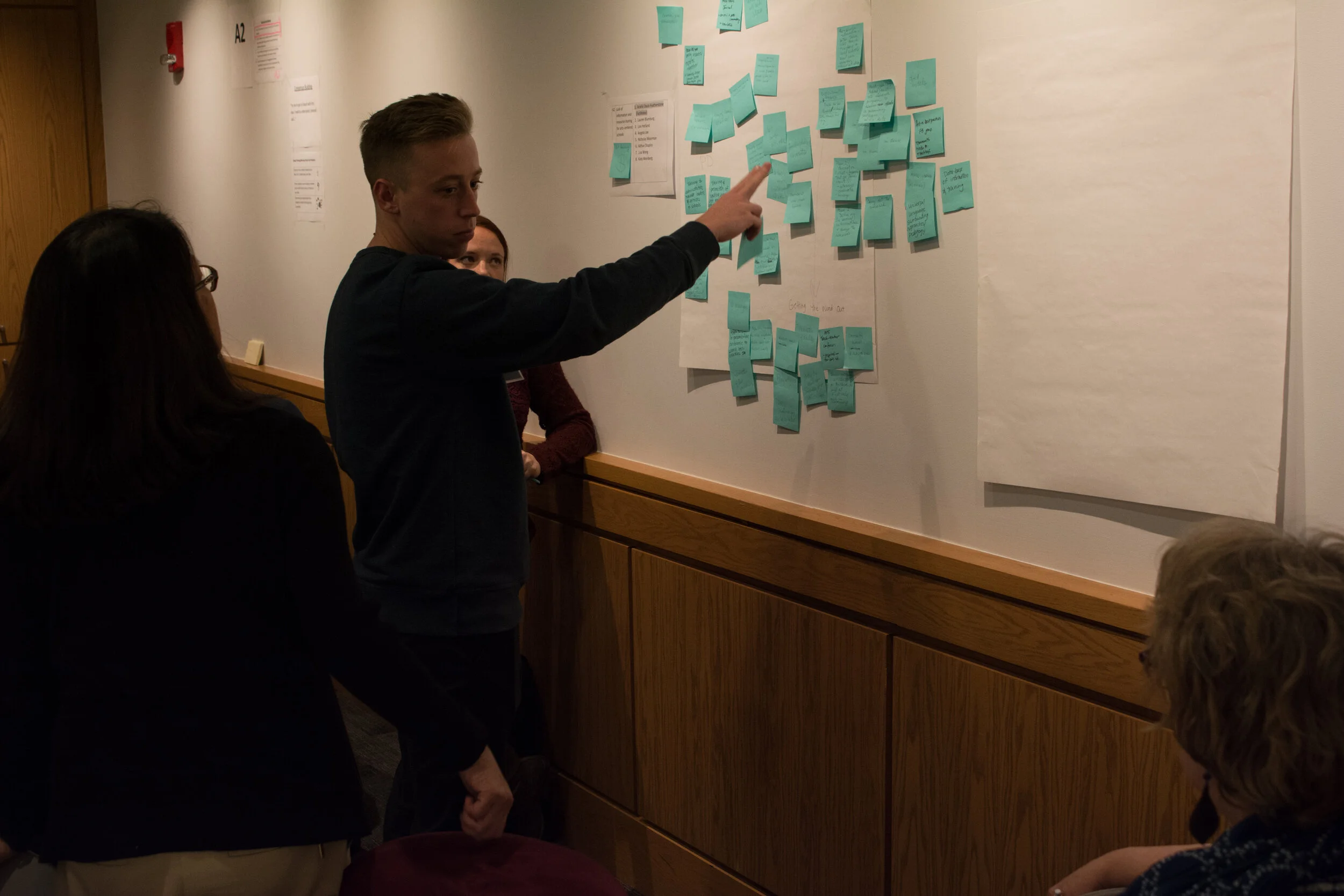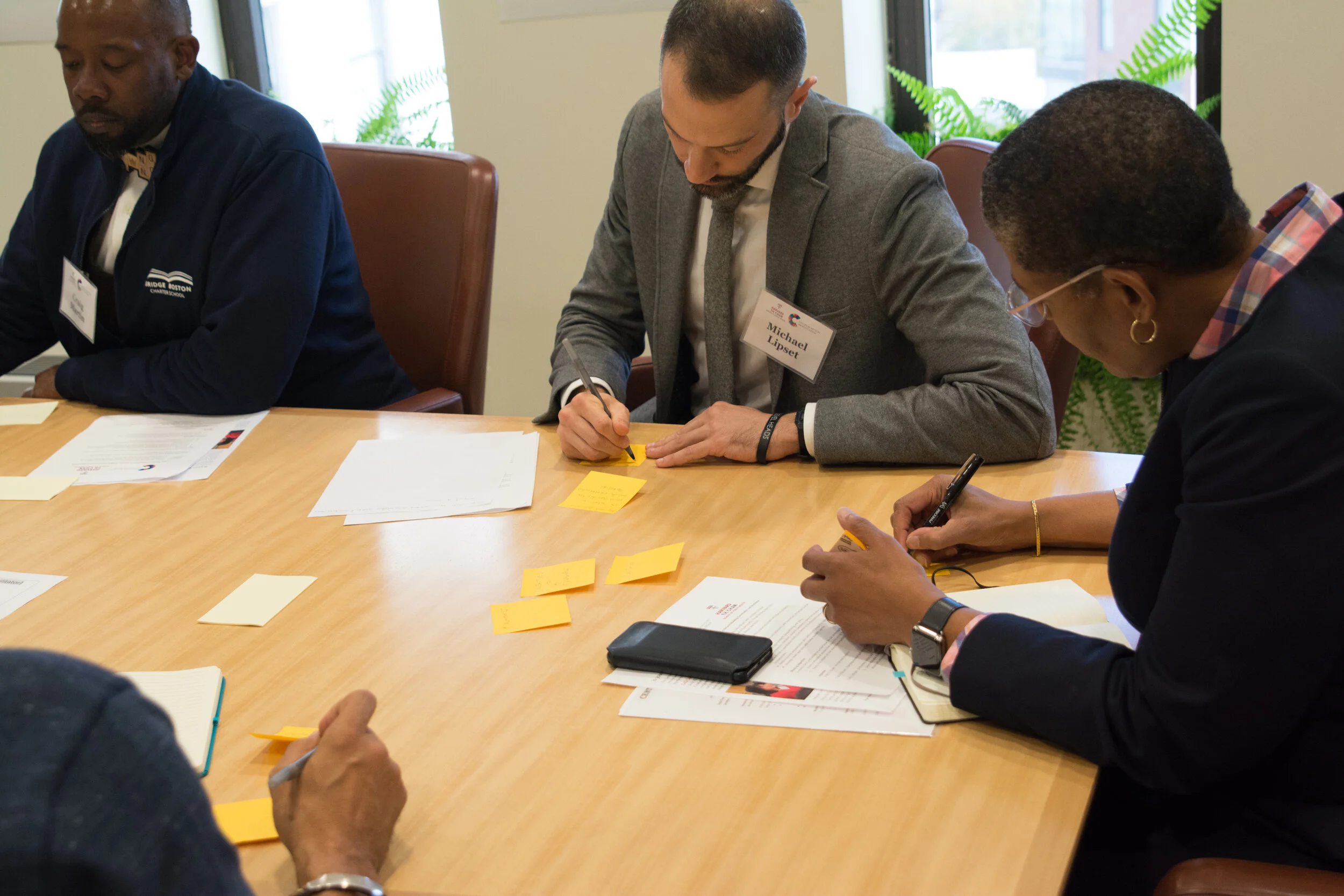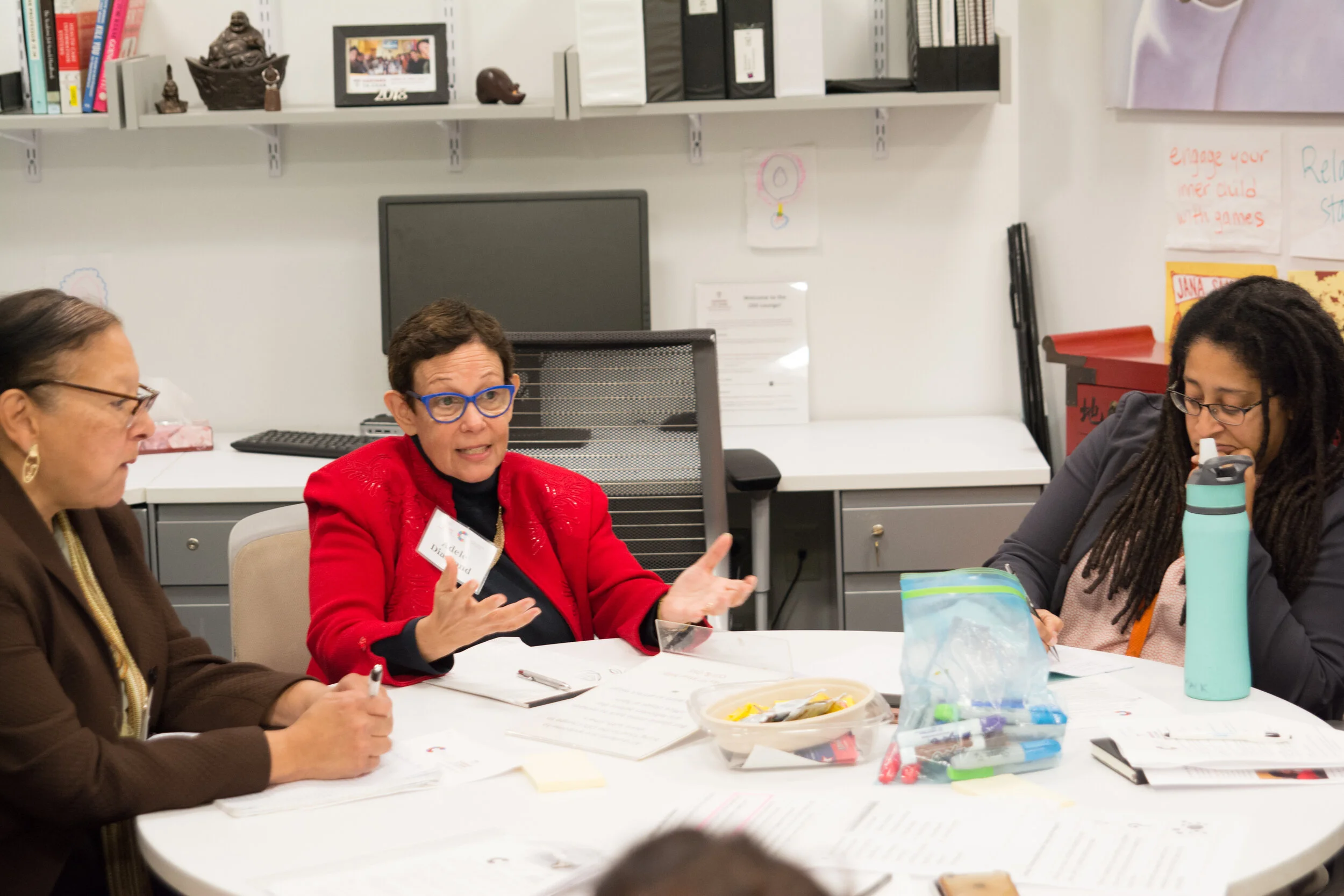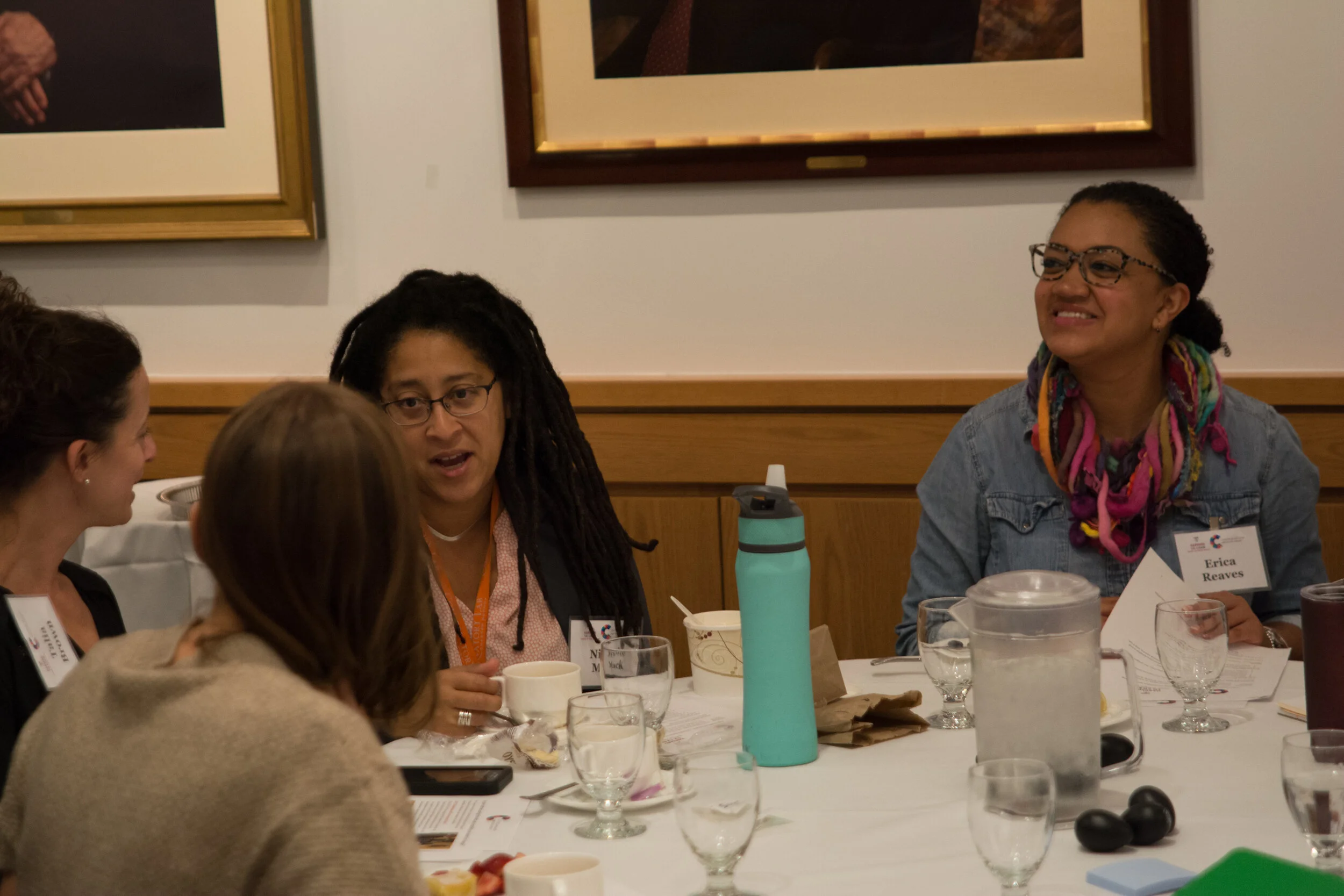Education and Public Health: A Network-Building Conversation
On Friday, October 18th, 2019, CAS hosted a network building summit at the Harvard T.H. Chan School of Public Health with school leaders, artists, and academics from across the United States and Canada. The objectives of the meeting were to norm, form, and decide on a clear focus for our work together to form a network of schools that place the arts at the center of learning and to assess the impact of that work from a public health perspective. Among the thought partners present were three-time Grammy award winner Esperanza Spalding and Dean Michelle Williams of the Harvard T. H. Chan School of Public Health.
Starting in Style
The afternoon started with a cajón. Tess Plotkin, Director of El Sistema at Conservatory Lab Charter School invited all present--including a Harvard Dean and Grammy-award winning artist--to sing “So Glad I’m Here,” a welcoming song sung daily by elementary school students at Conservatory Lab. Participants sang the things that brought them to the meeting--love, music and bicycles among them--and played cajóns and shakers in unison. It is perhaps an unusual sight for a group of professionals at such a caliber to begin a formal convening in this way--a tambourine isn't usually a centerpiece for white table cloth gatherings. However, for those of us working at the intersection of arts and education and committed to embodying the values and practices we are seeking to scale, this was exactly the way to begin.
In her opening remarks, Dean Williams shared, “This workshop is the culmination of an evolving wonderful friendship and relationship embedded upon our passion for using arts, music, science and public health to support optimal development of kids in school.” Following Dean Williams, CAS Executive Director Linda Nathan shared her hope of drawing on action-research practices and elevating the work of teacher leaders, noting, “We’re here to think about doing things differently--doing research that’s bottom up, that’s teacher-led.”
Esperanza Spalding, currently serving as a Professor of Practice at Harvard, spoke to her identity as “a creative and a dreamer.” As someone who has felt the healing capacity of music, she offered the question that has been the driving force of her recent work, asking, “How can music be distilled to apply to the neurological vestiges of trauma?”
Beginnings of a Network
When you ask Tess Plotkin to describe Esperanza Spalding’s February 2019 visit to Conservatory Lab, words like “transformative” and “magical” suggest it was a day of transcendence. As with each grade level orchestra at Conservatory Lab, the second grade ensemble was named after a renowned artist or composer--in this case, Esperanza herself. School leaders invited Esperanza to visit the school to make music with "her" orchestra.
Excited and inspired by this day, Esperanza connected Tess Plotkin with Eric Bethel, who at the time was serving as the principal of Turner Elementary School in Washington, DC. Turner Elementary School was selected as a partner of Turnaround Arts, the Kennedy Center’s initiative to harness the power of the arts to create success in struggling schools. After visiting each others’ schools and reflecting on the shared learning these visits facilitated, Tess and Eric discussed the need to continue learning from each other. Additionally, the two considered their experiences of shared needs--for grant writers, for arts instructional coaches, for district funding for arts programing--and wondered who or what could fill this need.
The Center for Artistry and Scholarship reached out to their contacts at a number of arts-centered schools and shared Tess and Eric’s wondering about how to support the unique needs of arts-centered schools. Through conversations with schools like New Visions Charter High School for the Humanities IV in Rockaway Park, New York and the High School for Recording Arts in St. Paul, Minnesota, they realized that there was a shared need for an organized group to facilitate information sharing and support services to arts centered schools generally. The idea of the network was born.
During the first communications with network partners, schools shared their need for more than just each other. They needed researchers to study and legitimize the work that was happening in their school buildings. Following a series of serendipitous encounters, Dean Michelle Williams of the Harvard T.H. Chan School of Public Health visited Conservatory Lab for a late May visit with Esperanza Spalding and Holly Bass, the National Director of Turnaround Arts. During this visit, Dean Williams shared that there was an urgent need for Harvard students and researchers to connect with Conservatory Lab and like schools and learn more about the complex relationship between the arts, trauma and resilience.
As the idea of a network for art-centered schools that drew on a public health lens emerged, additional researchers and thought partners were brought in. Adele Diamond, Canada Research Chair Professor of Developmental Cognitive Neuroscience at the University of British Columbia and leading scholar in the field of cognitive functioning was interested in connecting academic researchers with art-centered schools. Musician and activist Shaw Pong Liu wondered about the potential of centering an equity lens in the work of music-based school and community transformation. To facilitate this rich desire for collaboration around a shared vision, CAS and Harvard School of Public Health staff members decided that all partners--schools, thought-partners, activists and artists--should convene and democratically develop a plan of action for the network.
To help design the afternoon, CAS sent out a survey to determine the best structure to facilitate the network-planning convening. Schools shared that they wanted two things: equity of engagement between schools and partners, and an action-oriented and participatory agenda. Based on that feedback, CAS identified four problems to ideate around and modified the 1-Hour Design Thinking Mini Hack created by the Center for Collaborative Education to provide structure to the afternoon.
A Network Built on Solutions
In the fields of education and health, practitioners are well aware of the numerous problems that make our work difficult. The focus of this network building meeting was to ideate on solutions to those problems and to begin developing those as the founding features of our network. To do this, groups divided into five mini-hack design teams and developed solutions to the problems below:
Lack of information and resource sharing for arts-centered schools
Lack of relevant and accessible research on the benefits of arts-centered learning to promote student health and academic achievement
Lack of effective strategies for securing and sustaining resources and funding for arts-centered schools
Lack of collaboration and engagement between stakeholders invested in the role of arts/education (e.g. institutions of higher learning and schools)
The ideas developed in the working groups are summarized below:
Network Primary Goals
Create a repository/database that serves as a central hub for knowledge dissemination
Develop improvement-cycle for schools/districts that draws on arts-centered interventions
Refine research goals and processes. Research should assess for outcomes in the domains of mental health, cultivation of prosocial behavior, sense of self-efficacy, executive functioning, transferable skills for academic success. Researchers should work to define a criteria for quality arts programming with specific attention to pedagogical best practices.
Secure funding to elevate the work of the network through the creation of a “Why” campaign. Campaign will showcase the work of educators, researchers and artists with the goal of engaging and expanding grass-roots efforts to fully fund art and arts-centered education / arts as resilience.
Co-design interventions on schools sites with public health researchers and educators as partners. Graduate researchers in the field of public health (and possibly arts and education) will complete practicums as a component of their service learning initiative. Ideas include leading healing circles, conducting focus groups to collect qualitative data.
Network Secondary Goals
Creation of cross-departmental fellowship for arts, education and public health students to serve as research liaisons and propel work of network
Promote legislative action through grassroots organizing and locating/designing research that can speak to social and civic benefits of arts education
Convene through conferences and workshops regionally and nationally
Develop working groups including:
Researcher working group: consider technical aspects of research design around questions such as exposure time to treatment, addressing challenges around establishing control groups in k-12 contexts
Grant writing/finding working group
Media working group: share and develop media that promotes the work of the network. Partner with platform such as Netflix to create documentary / series on arts, trauma and education.
Legislative action group: research and promote legislative action that advances the goals of the network
Develop collective statement on anti-racist commitment and elevate non-western art forms
Draft network mission and vision statement
Building a Network. Building a Movement.
At the end of the day, when asked about her wishes for the network, Esperanza Spalding shared:
“Every person, every child who goes to school experiences the benefit of arts based education. Every single child is covered. It’s like what we would wish for healthcare. That every single person knows that their health is covered, that they’re taken care of. My wish would be, the various networks are wide enough that we’ll have to play together to cover every school and every child, that every child is born into the right to discover their creative powers and creative capacity.”
The CAS team feels enriched and inspired by this convening. This network grew out of a need for collaboration and cooperation among stakeholders and this day revealed the deep commitment of our partners to enlisting in this work collectively. We are working hard to develop the solutions incubated on that afternoon and begin putting them into action. We are committed to the notion that Esperanza put forward of arts access as a right held by all children. Our hope is that the network is a next step to advancing that right.
Education and Public Health: A Network-Building Conversation and Workshop Participant List
Guests
Adele Diamond, Canada Research Chair Professor of Developmental Cognitive Neuroscience at the University of British Columbia
Vikram Patel, The Pershing Square Professor of Global Health and Wellcome Trust Principal Research Fellow at the Harvard Medical School
Winston Cox, Director of Implementation for Turnaround Arts
Esperanza Spalding, Bassist, Vocalist, Composer, Teacher
Lois Hetland, Professor, Arts Education Department, Massachusetts College of Art and Design
Lisa Wong, MD, Associate Co-Director, Arts and Humanities Initiative at Harvard Medical School
Rick Tagliaferri, Director of the Capital Campaign, Conservatory Lab Charter School Foundation
Aithan Shapira, Artist and Facilitator, Senior Lecturer at the MIT Sloan School of Management
Shaw Pong Liu, musician and activist
Harvard T.H. Chan School of Public Health
Dr. Michelle A. Williams, Dean
Stacey King, Director of Practice Field Practice & Leadership
Katy Weinberg, Student
Jillian Tung, Student
Erica Reaves, current DrPh student
Luke Sutherland, Student Affairs staff member
Center for Artistry and Scholarship
Linda Nathan, Executive Director
Jill Davidson, Program Director
Carmen Torres, Co-Director of Perrone-Sizer Institute for Creative Leadership
Lisa Sankowski, Program Manager, Perrone-Sizer Institute for Creative Leadership
Stephanie Wong, Documenter
Conservatory Lab Charter School, Dorchester, MA
Nicole Mack, Principal
Tess Plotkin, Director of El Sistema
New Visions Charter High School for the Humanities IV, Rockaway Park, NY
Hannah Kehn, Principal
Nicholas Moorman, Art Teacher
Amanda Donaldson, Associate Director of Student Engagement
Orchard Gardens K-8 Pilot School, Boston, MA
Megan Webb, Principal
Talia Brown, K-8 Theater Teacher/Arts Team Lead
Turner Elementary School, Washington, DC
Eric Bethel, Instructional Superintendent
Seven Hills Charter Public School, Worcester, MA
Lauren Blumberg, Arts Residency Coordinator
High School for Recording Arts, St. Paul, MN
Tony Simmons, Executive Director
Michael Lipset, Lead Impact Catalyst
George H. Conley School, Boston, MA
Heron Russell, Music Teacher
Art in Motion, Chicago, IL
Kevin Kreller, Middle School Teacher and Instructional Coach
Angela Lee, Social Worker
Michael McCarthy, Executive Director of Student Services at Distinctive Schools
Bridge Boston Charter School, Boston, MA
Craig Martin, Executive Director
Jen Daly, Principal
Facilitators, Harvard Graduate School of Education
Steve Askar
Arielle Davis-Featherstone
Gemma Falivene
Lucy Griswold
Michele Rudy
